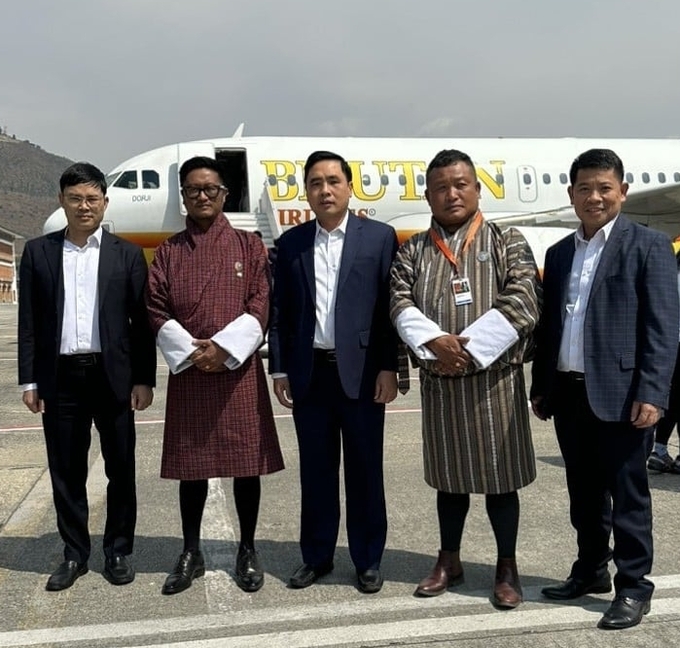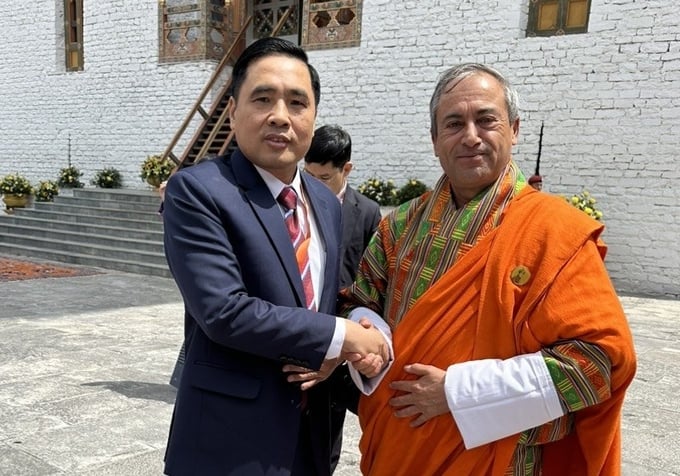November 27, 2025 | 19:31 GMT +7
November 27, 2025 | 19:31 GMT +7
Hotline: 0913.378.918
November 27, 2025 | 19:31 GMT +7
Hotline: 0913.378.918

Representatives of the Royal Government of Bhutan and the Ministry of Foreign Affairs and Foreign Trade welcomed the delegation of the Ministry of Agriculture and Rural Development of Vietnam.
Today, leaders of thirteen tiger range countries, including Vietnam, join together in the “Sustainable Finance for Tiger Landscape” Conference to secure significant international support for a range-wide tiger recovery plan that ties into national and global agendas on climate, biodiversity, and the One Health Programme.
The Conference is hosted by the Royal Government of Bhutan, under the Royal patronage of H.E. the Queen of Bhutan, Jetsun Pema Wangchuck. From Viet Nam’s side, Deputy Minister of Agriculture and Rural Development Nguyen Quoc Tri is joining to discuss with leaders from range countries and international organizations to advance tiger conservation efforts further globally
Tiger is one of the few species that their survival and recovery are so thoroughly intertwined with many of societies’ greatest challenges, including biodiversity decline, development and health concerns. They are deeply embedded in the culture and beliefs of many countries - a symbol of strength, good luck, and power.
But just over a century, the wild tiger population globally suffered a devastating decline, losing around 97% of their historic range. In 2010, their population was approximately 3,200 individuals.
Over the last twelve years, WWF’s Tiger Alive Initiative, was a major force to drive socio-political change for tiger conservation.
Significant progress has been made to conserve this world’s iconic species, with their population globally increased to 4,500 tigers remaining in the wild, in the latest estimation.
However, despite efforts, their habitat continues to decline, limiting them to just less than 3% of their historic range, according to a recent Tiger Conservation Landscape Assessment.

Deputy Minister of Agriculture and Rural Development of Vietnam Nguyen Quoc Tri met with Mr. Lyonpo D. N. Dhungyel, the Minister for Foreign Affairs and External Trade, Royal Government of Bhutan.
Even though tigers have not been recorded in the wild since 2000, Vietnam has issued a ban on trading wild tiger products. Illegal hunting, trading and farming is prosecuted according to the Criminal Code 2017.
In addition, a national action on tiger conservation (2014-2022) was launched to protect the species. However, there are still factors that challenge the impacts of these programs, including the high demand for tiger products, law enforcement capacity, lack of scientific study for tiger landscape recovery, an intricate web of online and offline trading, and tiger captive breeding facilities. These factors have driven our tiger to the brink of extinction.
In his sharing at the Conference, Mr. Tri confirmed the strong commitment of Viet Nam to save the tigers: “Vietnam, together with other countries, are taking actions to protect the species' landscapes, its prey and phasing out tiger farms that are not for conservation targets. We also commit to implementing our country's responsibility for biodiversity conservation in general and tiger in particular, within the framework of CITES conventions, Kunming-Montreal Global Biodiversity Framework to prevent and reverse biodiversity loss and meet the UNDGs.”
Mr. Van Ngoc Thinh, CEO of WWF-Viet Nam, said, “The conference is a great opportunity for Viet Nam to learn from other countries on tiger conservation, especially on tiger reintroduction and captive tiger management; explore potential collaboration; and mobilizing financial resources to replicate successful models shared in the conference. WWF will continue to support Vietnam financially and technically in the rehabilitation of the wild tiger population”
During the three-day conference, Mr. Tri will meet with the highest-level leaders of WWF to discuss the current and future collaboration between WWF and the Ministry. The two sides are keen on working together to gradually phase out tiger facilities with no conservation objectives and build the Central Annamites as a landscape model that can replicate the Bhutan for Life program in Vietnam as Vietnam for Life.
The conference is supported by the Tiger Conversation Coalition which includes several leading conservation organizations including the Environmental Investigation Agency (EIA), Fauna & Flora International (FFI), International Union for Conservation of Nature (IUCN), Natural State, Panthera, TRAFFIC, United Nations Development Programme (UNDP), Wildlife Conservation Society (WCS), World Wide Fund for Nature (WWF), and the Zoological Society of London (ZSL). It hopes to push for a renewed focus on tiger conservation, seeking greater financial commitments from the global community to ramp up conservation efforts significantly beyond just tiger recovery.
Translated by Huong Giang

(VAN) On November 27, in the meeting with Minister Tran Duc Thang, Mayor Yin Yong shared Beijing’s experience to improve environment and air quality.

(VAN) After 30 years, both sides identified strategic areas of cooperation: sustainable production, increasing coffee value and training for farmers.
/2025/11/27/4910-4-164708_294.jpg)
(VAN) On the afternoon of November 27 in Beijing, Minister of Agriculture and Environment Tran Duc Thang held a working session with several major Chinese enterprises operating in the agriculture and environment sector.

(VAN) The Department of Animal Health issued a provisional guideline requesting local authorities to increase surveillance, collect samples for testing, and conduct epidemiological investigations according to the established procedure.

(VAN) The United Nations recommends that Vietnam utilize data and artificial intelligence to enhance early disaster warnings and reduce GDP losses by 3.2% in the context of climate change.

(VAN) On the morning of November 27 in Beijing, Minister Tran Duc Thang and the Deputy Commissioner General of the General Administration of Customs of China signed a protocol on fresh jackfruit exports.

(VAN) As floodwaters recede, a vast network of irrigation works across eastern Gia Lai is emerging in a state of severe disrepair, with extensive damage demanding urgent restoration ahead of the 2025-2026 winter-spring cropping season.